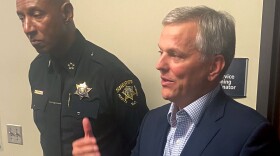This story appeared first in WFAE's weekly climate newsletter, which is out Thursdays. Sign up at WFAE.org/newsletters.
Like many Americans, Dean Kluesner is worried about climate change. After his retirement, the 74-year-old Charlotte resident and his wife, Christie, joined local organizations, including the nonpartisan Citizens Climate Lobby and a group that monitors the city of Charlotte's climate efforts.
What motivated him was "the scope of it, the scale of it, the size of it, the immensity of it, the overpowering-ness of it, the almost hopelessness of it, because no one was doing anything about it," Kluesner said.

Kluesner is one of a growing majority of Americans who say they're frustrated and worried about the future as the world drags its feet in reducing the pollution that causes global warming. A new poll by the Pew Research Center found that 63% of U.S. adults surveyed believe that harm from climate change will get worse during their lifetimes. And 71% say climate change is already harming people in the U.S.
"To me, it's obvious, especially this last year, with all the incredible heat spells we've been having," Kluesner said.
He noted that temperatures were over 80 degrees in the Charlotte area on Monday — well above October's mean high temperature of 73 degrees over the past decade, according to the National Weather Service. Federal climate scientists say climate change has pushed up average temperatures. Last year's average global temperature was 1.55 degrees Fahrenheit (0.86 of a degree Celsius) higher than the 20th-century average of 57 degrees Fahrenheit (13.9 degrees C), according to the National Oceanic and Atmospheric Administration.
And Kluesner said it's not just heat. "We've had to deal with smoke from Canada, all the fires, all that kind of stuff. The amplification of weather events should be showing people that this is not normal. And now, in my mind, it's time to do something about it," Kluesner said.
About 71% of those surveyed by Pew said that may include personal sacrifices — lifestyle changes such as switching to electric appliances from gas, driving an electric car or hybrid, or looking for less carbon-intensive products. Of those, 23% expect to make "major" sacrifices and 48% expect "minor sacrifices."
But Kluesner said he's not afraid of sacrifices. He believes some hardship now is worth that pain, he said.
"There's this thing called solution aversion. That's what it's called where people are afraid of the solution because they think it may reduce their lifestyle, or their ability to lead a normal, wonderful, happy life. I'm not afraid of that because I think the benefits are going to outweigh (sacrifices). But we will have to make adjustments," he said.
Other results from the Pew poll:
- 21% of U.S. adults reported participating in climate change-related activities in the past year, including donating to climate organizations or attending a protest. That was down from 24% two years ago.
- There are political and age gaps. Republicans and Republican-leaning adults are less likely than Democrats/Democratic-leaning adults to express concern about the need for sacrifices, and whether climate change will make their area a worse place to live. Similarly, young adults 18-29 are far more likely than their elders to be concerned. [A separate poll by Pew earlier this year found that the partisan divide on climate change is growing. The survey found that 78% of Democrats now describe climate change as a major threat to the country’s well-being, up from 58% a decade ago. Just 23% of Republicans view climate change as a major threat, compared with 25% a decade ago, according to Pew.]
- A majority of Democrats say climate news makes them anxious, while a majority of Republicans say they're suspicious of climate advocacy groups.
- Respondents believe the energy industry (55% of respondents), big businesses (52%) and the federal government (40%) can "do a lot" on climate change.
- By contrast, only 27% of respondents believe individuals can make a big difference in reducing the impacts of climate change.
Said Kluesner: "The individual Joe Public can't do a whole lot." He thinks governments and big businesses "need to step up."
The Pew Research Center surveyed 8,842 U.S. adults in September and October. You can find the full results at PewResearch.org.
And by the way, Kluesner is a member of the Charlotte chapter of the nationwide Citizens Climate Lobby. That group includes Republicans and Democrats concerned about climate change. They advocate a system of carbon fees and dividends, where polluters pay for burning fossil fuels and those payments are returned to citizens through monthly payments. That would help individuals pay for the costs of adapting to climate change — whether that's new appliances or higher utility costs. The system is already used in Canada.







